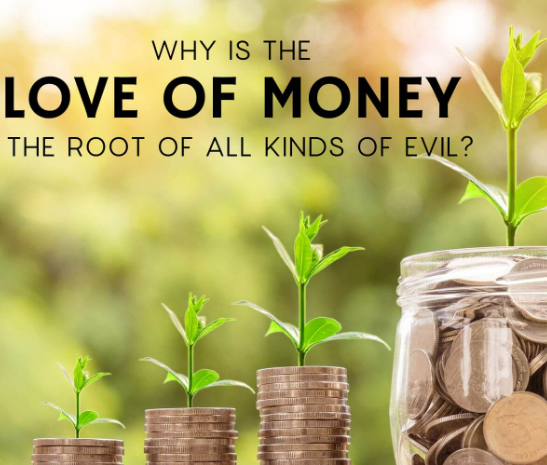Love of Money

10. For the love of money is the root of all evil: which while some coveted after, they have erred from the faith, and pierced themselves through with many sorrows.
1 Timothy 6:10 - A Theological Commentary On The Love of Money As The Root of All Evil
Introduction and Context
The Apostle Paul, in his First Epistle to Timothy, penned these weighty words: "For the love of money is the root of all evil: which while some coveted after, they have erred from the faith, and pierced themselves through with many sorrows" 1 Timothy 6:10. This verse stands as one of the most sobering warnings in all of Scripture regarding the spiritual dangers of avarice and covetousness.
Timothy, Paul's spiritual son and trusted companion, was ministering in Ephesus, where false teachers had infiltrated the church and were using their positions for personal gain. These false teachers, as Paul describes in the preceding verses, supposed "that gain is godliness" 1 Timothy 6:5, perverting the gospel for monetary profit. Against this backdrop, Paul provides clear instruction on the proper Christian attitude toward wealth and material possessions.
Exposition
"For the love of money is the root of all evil"
The word "love" in this passage comes from the Greek philargyria (φιλαργυρία), which literally means "love of silver" or "love of money". This compound word combines philos (loving) and arguros (silver), referring to the metal from which ancient coins were made. The term appears only once in the New Testament, specifically in this verse, yet its significance cannot be overstated.
The Greek word rhiza (ῥίζα), translated as "root," is placed first in the original text for emphasis. This metaphorical usage indicates the source, cause, or origin of something. As Vine's Expository Dictionary notes, the root is that from which something springs forth and draws its nourishment.
The phrase "all evil" translates the Greek panton ton kakon (πάντων τῶν κακῶν). While some modern translations render this as "all kinds of evil," the KJV Bible maintains the fuller sense of the original. Matthew Henry observes that "What is the root of all evil; the love of money: people may have money, and yet not love it; but, if they love it inordinately, it will push them on to all evil.
"which while some coveted after, they have erred from the faith"
The word "coveted" comes from the Greek oregomenoi (ὀρεγόμενοι), meaning to stretch oneself after, to reach out for, or to long for. This speaks of an inordinate desire and eager pursuit of wealth that goes beyond legitimate needs.
The phrase "erred from the faith" uses the Greek apeplanethesan (ἀπεπλανήθησαν), meaning to wander away, to be led astray, or to be seduced. John Gill explains that this refers to those who "have declined that path, and have not so much as heard the word; and if they have heard and embraced it, yet when persecution arises because of it, they drop their profession of it".
"and pierced themselves through with many sorrows"
The word "pierced" translates periepeiran (περιέπειραν), which means to pierce through on all sides, as with a sword or spear. This vivid imagery suggests wounds inflicted from every direction, creating a picture of complete suffering.
The "many sorrows" (odunais pollais) refers to the inevitable consequences of pursuing wealth above all else. As Matthew Henry notes, these sorrows arise "from a guilty conscience, tormenting passions, desires contrary to reason, religion, and one another".
Biblical Examples of The Love of Money
Scripture provides numerous examples of individuals who fell into the snare of covetousness, serving as warning beacons for all believers:
Achan - His love of money led him to take the forbidden spoils of Jericho, resulting in Israel's defeat at Ai and ultimately his own death by stoning.
Gehazi - The servant of Elisha secretly pursued Naaman for silver and garments, lying to obtain them, which resulted in being struck with leprosy forever.
Judas Iscariot - Perhaps the most tragic example, Judas betrayed the Lord Jesus Christ for thirty pieces of silver, demonstrating how the love of money can lead to the ultimate apostasy.
Balaam - Though he spoke prophetically, he "loved the wages of unrighteousness" and ultimately perished in his covetousness.
These examples illustrate the truth that, as one commentary notes, "There is no kind of evil that the love of money will not produce".
The Contrast with True Godliness
Paul contrasts the love of money with genuine godliness in the surrounding verses. He states, "But godliness with contentment is great gain" 1 Timothy 6:6. The true Christian finds satisfaction not in accumulating wealth but in walking with God and being content with His provision.
The apostle reminds Timothy that "we brought nothing into this world, and it is certain we can carry nothing out" 1 Timothy 6:7. This eternal perspective should govern the believer's attitude toward material possessions.
The Theological Implications
Money as Morally Neutral
It is crucial to understand that money itself is not evil. As John Gill observes, "not money itself, as silver and gold, which are God's creatures, and his gifts, and may be used to, and answer many good purposes; but the love of it". The sin lies not in possession but in the heart's disposition toward wealth.
The Danger of Idolatry
The love of money constitutes a form of idolatry, as it places material gain above devotion to God. As our Lord Jesus Christ declared, "Ye cannot serve God and mammon" Matthew 6:24. When money becomes the object of our affection and trust, it usurps God's rightful place in our hearts.
The Necessity of Contentment
True contentment comes not from having much but from being satisfied with God's provision. The believer is called to be content with "food and raiment" 1 Timothy 6:8, finding his true treasure in heavenly things rather than earthly riches.
Practical Application
The Call to Flee
Paul immediately follows this warning with a direct charge to Timothy: "But thou, O man of God, flee these things; and follow after righteousness, godliness, faith, love, patience, meekness" 1 Timothy 6:11. The believer must actively flee from the love of money and pursue spiritual virtues instead.
The Importance of Stewardship
Christians are called to be faithful stewards of whatever God has entrusted to them, using their resources for His glory and the advancement of His kingdom. This includes providing for one's family, supporting the work of the church, and helping those in need.
The Warning for the Rich
Paul later addresses those who are wealthy, warning them not to trust in their riches but to "trust in the living God, who giveth us richly all things to enjoy" 1 Timothy 6:17. They are to "do good, that they be rich in good works, ready to distribute, willing to communicate" 1 Timothy 6:18.
Conclusion
The love of money represents one of the most dangerous spiritual snares facing believers in every generation. It leads to apostasy, inflicts grievous wounds upon the soul, and ultimately destroys both faith and character. The historical examples of Achan, Gehazi, and Judas stand as perpetual warnings of the destructive power of covetousness.
In contrast, the godly believer finds true contentment in walking with God, using material blessings as tools for His service rather than objects of worship. The wise Christian heeds Paul's warning and pursues righteousness, godliness, faith, love, patience, and meekness - treasures that moth and rust cannot corrupt and thieves cannot steal.
As we meditate upon these solemn words, let us examine our own hearts and ensure that our affections are set upon things above, not upon things on the earth. For in doing so, we guard ourselves against the root of all evil and find our true treasure in Christ Jesus our Lord.
The Parable of The Mexican Fisherman

The Parable of the Mexican Fisherman is a well-known modern tale that explores themes of happiness, success, and the true meaning of wealth and fulfillment. Though its origins are uncertain, the story is often attributed to American writer Heinrich Böll or inspired by similar folktales.
The Story
A businessman is vacationing in a small coastal Mexican village when he sees a fisherman dock his small boat with several large fish. The businessman compliments the fisherman on his catch and asks how long it took to catch them.
"Only a little while," the fisherman replies.
The businessman asks, "Why don’t you stay out longer and catch more fish?"
The fisherman responds, "I have enough to support my family’s needs."
The businessman then asks, "But what do you do with the rest of your time?"
The fisherman says, "I sleep late, fish a little, play with my children, take siestas with my wife, stroll into the village each evening to sip wine and play guitar with my friends. I have a full and busy life."
The businessman scoffs, "I’m a Harvard MBA. I could help you. You should spend more time fishing, buy a bigger boat, and eventually several boats. Soon you could open your own cannery. You’d control production, processing, and distribution. You’d need to leave this small village and move to Mexico City, then Los Angeles, and eventually New York City, running your expanding enterprise."
The fisherman asks, "But how long will this all take?"
"Fifteen, twenty years," replies the businessman.
"And then what?"
The businessman laughs and says, "That’s the best part. When the time is right, you would sell your company stock and become very rich. You would make millions!"
"Millions. Then what?"
The businessman says, "Then you could retire, move to a small coastal village, sleep late, fish a little, play with your kids, take siestas with your wife, stroll to the village in the evenings to sip wine, and play your guitar with your friends."
The Moral
The story illustrates the irony of modern definitions of success—that sometimes, in pursuit of "more," people end up chasing what they already have or could simply enjoy now.
Main themes and lessons:
-
Contentment: True happiness often comes from appreciating what we have, rather than always striving for more.
-
Perspective: Wealth and success are personal and relative, not just based on money or status.
-
Simplicity: A simple life filled with meaningful activities may be more fulfilling than the complex pursuit of material gain.
-
Questioning societal values: It challenges the assumption that working harder and accumulating more is always better.
In Summary
The Parable of the Mexican Fisherman invites us to reflect on our own values, consider what happiness really means, and recognize that the good life may already be within reach, without the need for endless striving.
Also see: